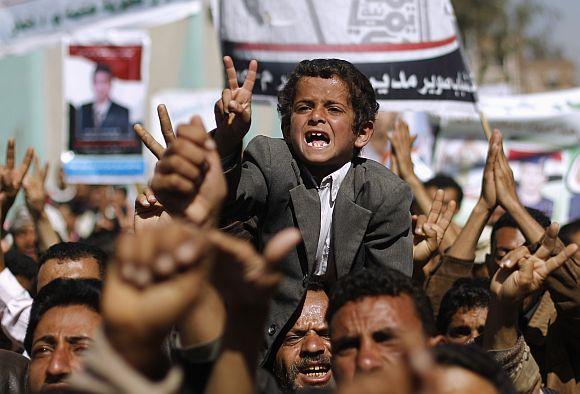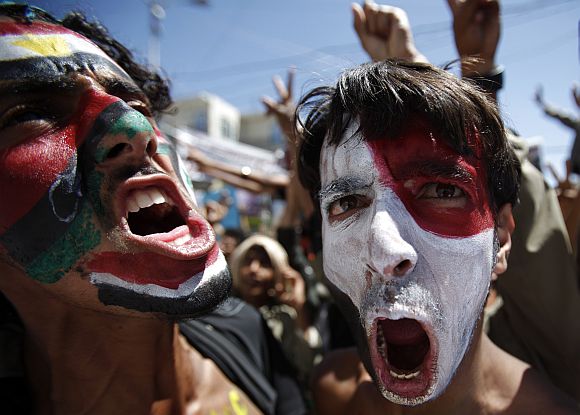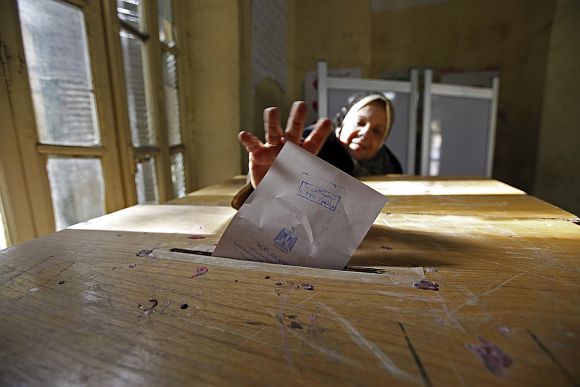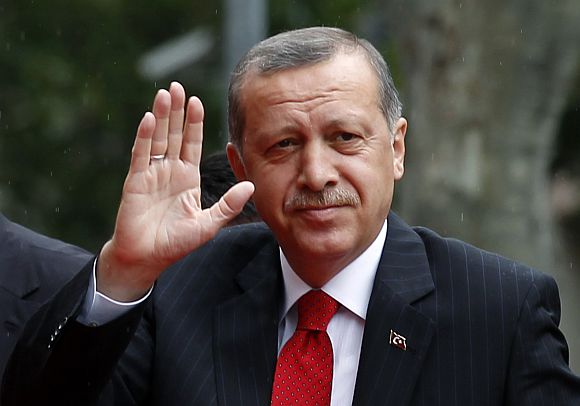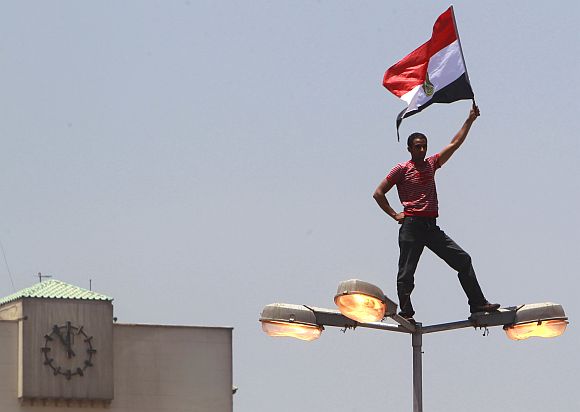 | « Back to article | Print this article |
How 'Arab Awakening' has transformed the Muslim world
The 'Arab Awakening' will fundamentally alter the notion that Islam is incompatible with democratic capitalism, writes Shahid Javed Burki
What most refer to as the 'Arab Spring' but the Arabs themselves prefer to call the 'Arab Awakening' will undoubtedly have profound implications for the Muslim world.
This will be so not only in the countries that have been touched by the unfolding revolution.
In these states, Muslims constitute large majorities. It will also affect those in which Muslims have significant numbers but are in a minority. India belongs to the latter group. However, I will today deal with the first set of countries, leaving the discussion of the impact on the Muslim community in India for later.
The movement that started with the self-immolation of a fruit vendor in Tunisia has touched many shores of political and economic Islam.
Click on NEXT to read further...
The writer is a former finance minister of Pakistan
How 'Arab Awakening' has transformed the Muslim world
When the history of the Muslim world in the 20th and 21st centuries gets to be written, this event in Tunisia will hold significance equivalent to that of the collapse of the Ottoman Empire, the deep penetration into this part of the world of colonial powers from Europe, and the establishment of the Jewish state of Israel in Palestine.
The question of how the death of a fruit vendor triggered this chain of events has been described, debated and answered in learned journals and newspaper columns for more than a year.
I will explore today the main aspects of the revolution that started from this act of personal sacrifice by an individual of humble means who was frustrated with the constraints imposed on him by an unfriendly system.
Click on NEXT to read further...
How 'Arab Awakening' has transformed the Muslim world
Looking at this rapidly evolving revolution, I see at least three developments that will have lasting effects. These cover politics, economics and external relations. I will begin with politics.
It was not suspected by the youth who marched into the Arab streets or assembled in the public square that Islamic parties of different persuasions would be the main beneficiaries of the revolution they were starting.
Free and fair elections in three countries in North Africa -- Tunisia, Morocco and Egypt -- have brought to the front Islamic parties that were held in check for decades by the authoritarian rulers who governed these countries.
That that would happen was inevitable. They were the only parties organised enough to take advantage of the change that came with the revolution in the streets. Their coming to the forefront of politics is different from the Islamic domination of politics in Lebanon and the West Bank.
Click on NEXT to read further...
How 'Arab Awakening' has transformed the Muslim world
There, Hezbollah and Hamas wield power only for one reason: to improve the situation of the Palestinians with reference to the powerful presence in that area of the Jewish state.
By taking power through constitutional means, these groups in North Africa will demonstrate through their actions that there is no real contradiction between democracy and Islam.
As Anwar Ibrahim, who was recently acquitted by a Malaysian court on charges of sodomy, said to his Financial Times host at a lunch in a Mumbai restaurant, there should no longer be any reason to see this contradiction.
"The vast majority of Muslims are under democratic rule," he said to his host, "or are opting for democracy as in Egypt."
He mentioned Turkey's Recep Tayyip Erdogan as an inspiration.
The Turkish prime minister has not tinkered with the institutional substance of Turkey's evolving political system. Where he is departing from the norms of the Turkish system as established by Mustafa Kemal Ataturk is the abandonment of the aggressive symbols of westernisation that marked the secularism practised by the Kemalist state.
Click on NEXT to read further...
How 'Arab Awakening' has transformed the Muslim world
This example is important in one other way. In Ankara, Erdogan has succeeded in bringing the armed forces under the control of the state. He was able to do that by winning three consecutive elections -- each with an increasing majority -- thus demonstrating that the people were behind him.
The people are also behind the emerging political forces in Egypt, as they work to establish civilian oversight over the working of the military. Domination of the political system by the military has been a common feature of the political systems across the Muslim world. That may be about to change.
The march of the Islamic groups in North Africa is the result of the alienation of the masses from the systems established by the authoritarian rulers. This is where economics enters the picture.
Click on NEXT to read further...
How 'Arab Awakening' has transformed the Muslim world
The Islamic groups believe that they have the ideology that can improve the lot of the citizenry. They demonstrated some of this by running social welfare programmes when the state had effectively turned its back on the underprivileged.
As the Muslim Brotherhood is preparing to take over the reins of the state, the group's leaders point out that, with one exception, Islamic economic principles are not very different from Western capitalism.
Islam believes in private initiative and enterprise as much as capitalism does. The difference is that Islam places enormous emphasis on caring for those the economic system does not reach.
Click on NEXT to read further...
How 'Arab Awakening' has transformed the Muslim world
How should that be done is the debate that is taking place in the West -- the question of "one per cent versus 99 per cent" is the slogan of the Occupy Wall Street movement in the United States.
The debate will influence the working of the American state. In Islam there is a built-in system of taxes to raise money from the rich to help the poor.
The final change that will come as the Arab revolution affects the making of public policy is to distance the countries in the area from those in the West.
The "default position" that marked the working of the Arab state, in which all foreign relations had to meet the test of Western approval, will be replaced by those that will work for the benefit of the citizenry. Here too, economics will play its part, as the West loses its pre-eminent position in the global economy to the rising East.
The Arab Awakening, therefore, is a transformative development that will leave a deep mark on the societies it is touching and will go on to touch.
The writer is a former finance minister of Pakistan
